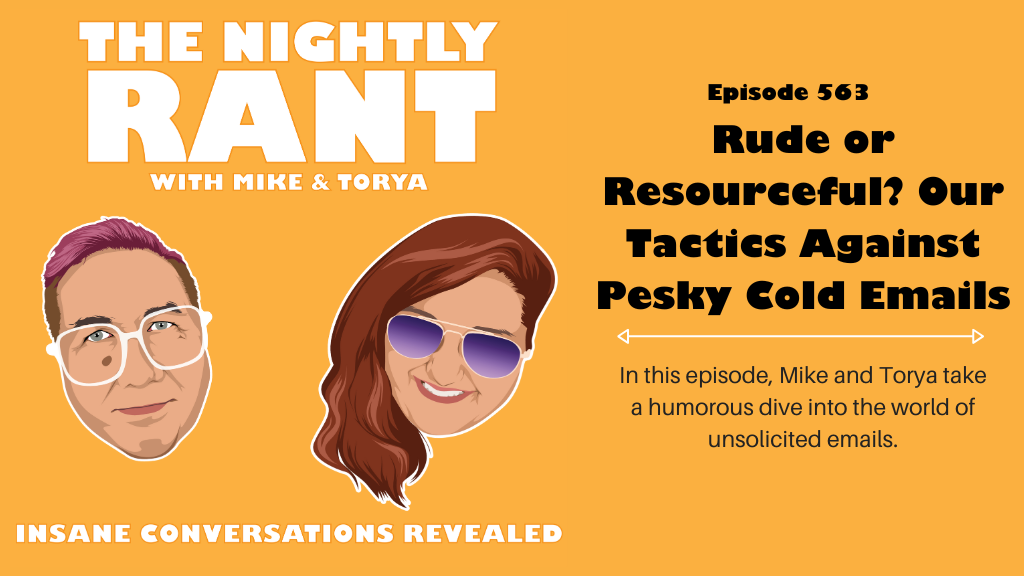We may earn money or products from the companies mentioned in this post.
The Nightly Rant Episode 563 Summary
Mike and Torya take a humorous dive into the world of unsolicited emails on the Nightly Rant. They explore the evolution from traditional mailing lists to today's rampant cold emails, discussing the impact of data factories and the lack of unsubscribe options. They share personal experiences with persistent spammers and offer candid reactions to ongoing digital intrusions. This engaging conversation offers a blend of frustration and humor as they tackle the nuisance of unwanted emails and highlight the importance of setting boundaries in digital communication. Tune in for insightful commentary on modern email etiquette.
The Nightly Rant Episode 563 Show Notes
The Email Overload: Navigating the Challenges of Modern Communication
Key Takeaways:
- Email marketing lacks the opt-in rigor it once had, leading to an influx of unwanted communication.
- Cold emails without proper unsubscribe options contribute to a frustrating user experience.
- Legislation and responsible practices are essential in managing the ever-growing flood of email correspondence.
In the digital age, email reigns supreme as an essential tool for both personal and professional communication. Yet, as Mike and Torya explore in their Nightly Rant, the misuse of email can turn this invaluable tool into a source of relentless irritation. Email marketing practices have drastically shifted over the years, and what was once an opt-in sanctuary has now morphed into a chaotic free-for-all, where inboxes are bombarded by cold emails from faceless entities.
The Evolution of Email Marketing
One of the most striking themes from the Nightly Rant is the transformation of email marketing. Torya recalls how “[p]eople would refuse to send an email unless someone signed up on their list and then confirmed that they wanted to be on,” emphasizing the past importance of consent. The double opt-in method was once a hallmark of responsible email marketing, ensuring that only those genuinely interested received communication. However, as noted, “[t]hese days, cold emails have gone nuts because they have these data factories that have everybody's information and then they sell it.”
This shift represents a significant paradigm change. Cold emails, often sent en masse without explicit permission, reflect a broader cultural deviation from consent-based practices. Businesses, eager to expand their reach, rely on data brokers to acquire vast lists of contacts, commonly leading to the infamous digital clutter most people encounter daily. The implication here is a systemic issue where privacy rights and consumer protection laws have lagged behind technological advancement.
Consequences of Omitted Unsubscribe Links
When it comes to unwanted emails, the lack of an unsubscribe option is a recurrent frustration highlighted by the speakers. Mike passionately points out the absence of unsubscribe links in some emails, stating, “This could have been so much easier on both of us had you just followed US Law and included an unsubscribe link in your email.” This absence is an oversight and a breach of legal standards set to protect consumers from spam.
The problem is twofold: it inundates individuals with irrelevant communication, and it forces them into a perpetual cycle of deleting or blocking senders, causing unnecessary digital stress. The failure to include an unsubscribe mechanism irritates users and damages the sender's reputation. As Torya decisively mentions in her response to persistent emails, “I obviously don't want the crap you're peddling. I never gave you permission to spam email me.” This interaction underscores a shared consumer sentiment where digital boundaries are overstepped, eroding trust and derailing potential business relationships.
Need for Responsible Practices and Legislation
A recurring theme in the discussion is the need for responsible practices and stronger legislation to regulate email marketing. Mike alludes to an exciting point about Instagram's policy that only allows one unsolicited message unless the recipient responds, imagining if “it was like that with email.”
This reflects a significant area requiring development: the regulation of electronic communications. Analogous to the laws governing traditional advertising, email communication should adhere to stringent controls ensuring sender accountability. The speakers suggest that legislative bodies should take cues from platforms like Instagram, which develop user-centric models to protect consumer privacy and prevent harassment.
Moreover, beyond legislation, enterprises are responsible for adopting ethical marketing practices. The philosophy should shift from mass distribution to targeted, consent-based interaction. Businesses stand to gain more by respecting potential customers' preferences, fostering richer engagement, and building trust.
As the conversation winds down, it's evident that the world of email communication is ripe with challenges. The reality for many users is a constant battle against the tide of irrelevant, unsolicited emails. Mike and Torya shed critical light on the need to evolve consumer protection laws and marketing ethics. As they humorously yet insightfully critique the current state, the overarching message remains clear: it's time to reboot how email marketing is approached, ensuring it aligns with the values of consent, relevance, and respect.
The path forward lies in harmonizing legislation with technology, crafting clear guidelines that protect consumers while still allowing businesses to connect meaningfully with their audience. As Mike and Torya illustrate with their lively debate, the issue is more than an annoyance; it's a clarion call for the digital world to recalibrate and prioritize the integrity of communication.
| Timestamp | Summary |
| 0:15 | The Evolution and Ethics of Cold Email Practices |
| 2:53 | Frustrations with Persistent Unsolicited Emails and Lack of Unsubscribe |
| 6:32 | Confronting Persistent Spam Emails and Legal Threats |
| 9:07 | Global Tech Collaboration Challenges and Opportunities |
| 9:29 | Dealing With Spam Emails and Privacy Concerns |
| 14:03 | Mistaken Identity: Living at a UPS Store Address |
| 14:57 | Email Etiquette: Unsubscribe Links and Follow-Up Limits |

